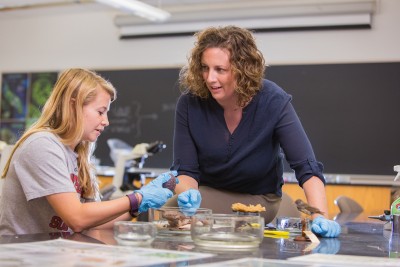Learning from 2020: Science Literacy
Ohio Wesleyan faculty share their thoughts on lessons they've learned from 2020 and how they hope we can move forward to a better world in 2021.
Teaching and Understanding Science
Zoology MajorBy Shala Hankison, Ph.D.
 Scientists often work in a bubble. We communicate with other scientists, often using specialized language, about concepts and ideas that are specialized and complex. The ongoing COVID-19 pandemic has often made those scientific bubbles even smaller and more exclusive in a time that has also made clear how important scientific literacy is to nonscientists.
Scientists often work in a bubble. We communicate with other scientists, often using specialized language, about concepts and ideas that are specialized and complex. The ongoing COVID-19 pandemic has often made those scientific bubbles even smaller and more exclusive in a time that has also made clear how important scientific literacy is to nonscientists.
Understanding how science is done needs to be clearer to all people, the vast majority of whom are not scientists. The huge amount of misinformation being spread on social media and in all levels of government, from city to national, shows how easy it is to misunderstand scientific concepts and to politicize scientific findings.
This problem is not new, but with more than 350,000 Americans dead from COVID-19, it saddens me that so many people are turning away from science instead of toward it.
We need to teach and understand science as a process. We need to do more to integrate science with philosophy, economics, sociology, and other disciplines to find solutions to the current and future problems. We need to break out of our scientific bubbles to better communicate science to everyone.
Shala Hankison is an Associate Professor of Zoology. Her research explores the role of animal behavior as an evolutionary mechanism, particularly in fishes. Watch her i³ lecture "Tinder for Fish: Sexual Selection and Evolution."
